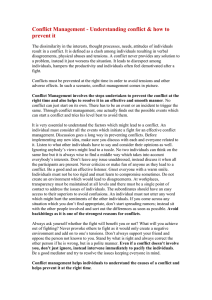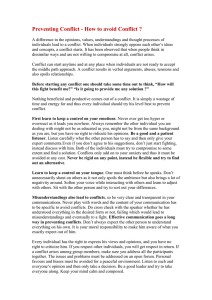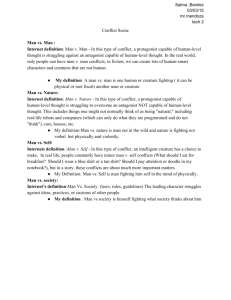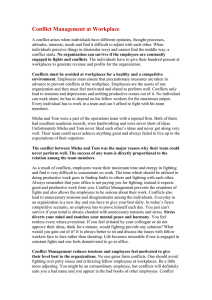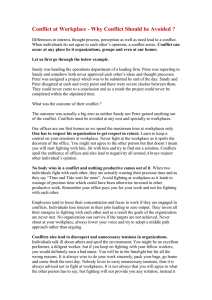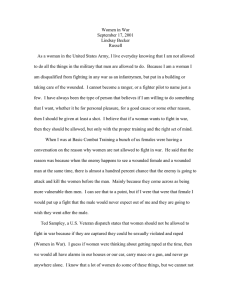Importance of Conflict Management
advertisement
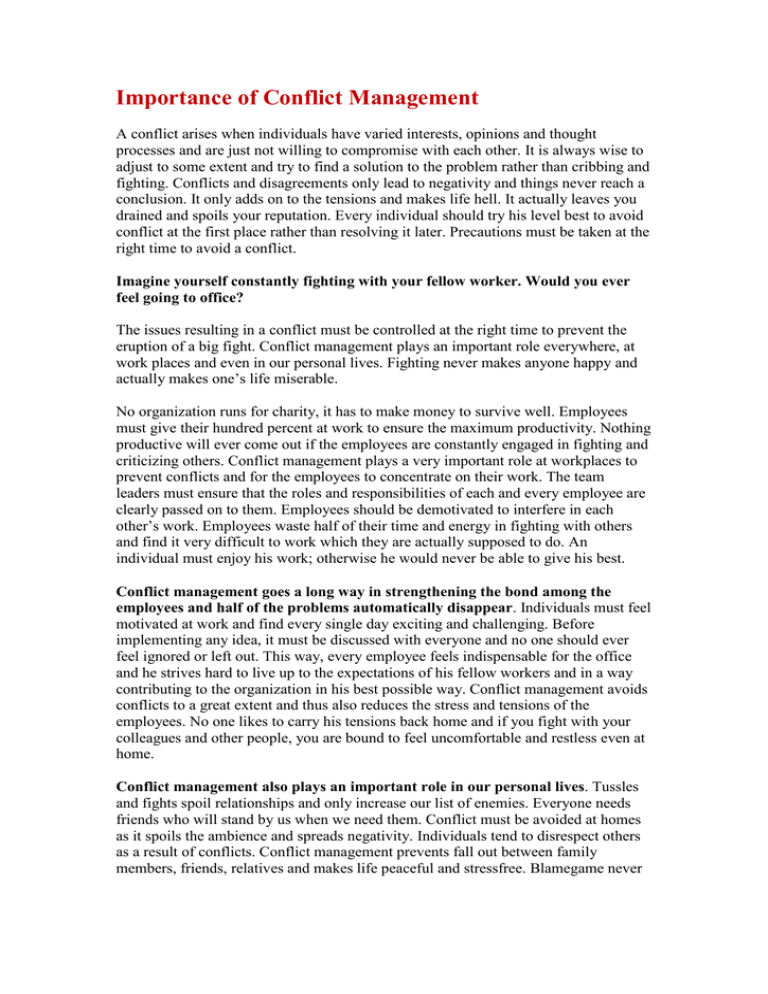
Importance of Conflict Management A conflict arises when individuals have varied interests, opinions and thought processes and are just not willing to compromise with each other. It is always wise to adjust to some extent and try to find a solution to the problem rather than cribbing and fighting. Conflicts and disagreements only lead to negativity and things never reach a conclusion. It only adds on to the tensions and makes life hell. It actually leaves you drained and spoils your reputation. Every individual should try his level best to avoid conflict at the first place rather than resolving it later. Precautions must be taken at the right time to avoid a conflict. Imagine yourself constantly fighting with your fellow worker. Would you ever feel going to office? The issues resulting in a conflict must be controlled at the right time to prevent the eruption of a big fight. Conflict management plays an important role everywhere, at work places and even in our personal lives. Fighting never makes anyone happy and actually makes one’s life miserable. No organization runs for charity, it has to make money to survive well. Employees must give their hundred percent at work to ensure the maximum productivity. Nothing productive will ever come out if the employees are constantly engaged in fighting and criticizing others. Conflict management plays a very important role at workplaces to prevent conflicts and for the employees to concentrate on their work. The team leaders must ensure that the roles and responsibilities of each and every employee are clearly passed on to them. Employees should be demotivated to interfere in each other’s work. Employees waste half of their time and energy in fighting with others and find it very difficult to work which they are actually supposed to do. An individual must enjoy his work; otherwise he would never be able to give his best. Conflict management goes a long way in strengthening the bond among the employees and half of the problems automatically disappear. Individuals must feel motivated at work and find every single day exciting and challenging. Before implementing any idea, it must be discussed with everyone and no one should ever feel ignored or left out. This way, every employee feels indispensable for the office and he strives hard to live up to the expectations of his fellow workers and in a way contributing to the organization in his best possible way. Conflict management avoids conflicts to a great extent and thus also reduces the stress and tensions of the employees. No one likes to carry his tensions back home and if you fight with your colleagues and other people, you are bound to feel uncomfortable and restless even at home. Conflict management also plays an important role in our personal lives. Tussles and fights spoil relationships and only increase our list of enemies. Everyone needs friends who will stand by us when we need them. Conflict must be avoided at homes as it spoils the ambience and spreads negativity. Individuals tend to disrespect others as a result of conflicts. Conflict management prevents fall out between family members, friends, relatives and makes life peaceful and stressfree. Blamegame never helps anyone, instead it makes life miserable. No idea can ever be implemented if the individuals fight among themselves. Conflict management helps to find a middle way, an alternative to any problem and successful implementation of the idea. Problems must be addressed at the right time to prevent conflict and its adverse effects at a later stage. Through conflict management skills, an individual explores all the possible reasons to worry which might later lead to a big problem and tries to resolve it as soon as possible. Conflict Management is very important because it is always wise to prevent a fight at the first place rather than facing its negative consequencies. Stress disappears, people feel motivated, happy and the world definitely becomes a much better place to stay as a result of conflict management http://www.managementstudyguide.com/importance-of-conflict-management.htm
